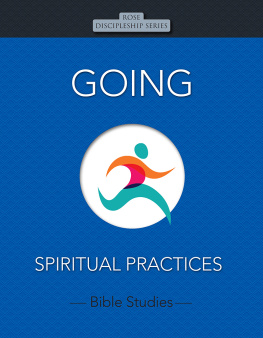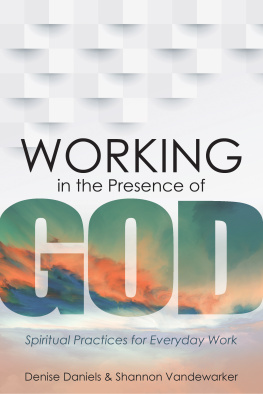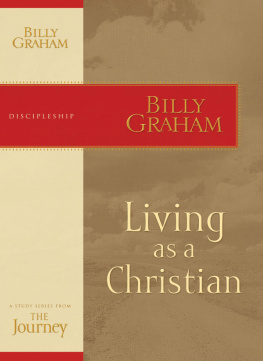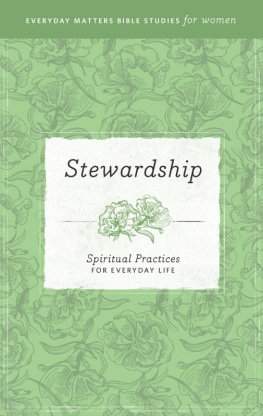Introduction
One day, during my sixteenth year, I became a Christ-follower. That gracious word of invitation, Follow me, rooted in a great love that had sought me from my very beginnings, burned its way into my heart and evoked both desire and response. Since that moment of new beginnings I have been exploring how to live out within the context of my daily life my spiritual identity as Gods beloved. This search has connected me with the lives of many other seeking pilgrims along the Way. In recent years I have come to recognize this common seeking as a widespread yearning in the hearts of men and women for a vital and real spirituality.
Spirituality is a slippery word. Some are suspicious in its presence. For those whose daily lives revolve around frantic timetables of preparing breakfast, getting children to school on time, holding down a stressful eight-to-five job, paying monthly accounts and cleaning the house, the word sounds somewhat strange and impractical. It suggests another world of inactivity, passivity and uninterrupted silences. For those whose lives have been scarred by the wounds of suffering and oppression, the term often suggests escapism, indifference and non-involvement. Indeed the word needs definition. Therefore let me clarify the specifically Christian sense in which I shall be using the word: Spirituality is being intentional about the development of those Christ-shaped convictions, attitudes and actions through which our identity as Gods beloved is formed and given personal expression within our everyday lives.
Amidst this widespread yearning for a vital and real spirituality there is need for careful discernment. Many expressions of spirituality making the rounds within contemporary Christian congregations can only be described as foreign to the biblical tradition and unrelated to the spirit of the crucified and risen Lord. Often they are obsessively concerned with personal needs and reflect minimal concern for those who suffer. Alternatively, a spirituality of social struggle and involvement is frequently endorsed which avoids the biblical imperative for personal conversion and transformation. Such endorsement falls victim to the dangerous illusion that we can build a more just, equitable and compassionate society while we remain the same and continue life as usual.
Signposts
In this workbook I offer sixteen signposts toward the development of a renewed spirituality that is centered in the life of Jesus, our ever-present Savior and Lord, faithful to the treasures of the diverse streams within the Christian tradition, accessible to the people living next door, interwoven with those practical concerns that constitute daily living, and also deeply related to those human struggles taking place on the streets. I write neither as an academic theologian nor as an expert in the study of spirituality. The words that follow found their birth amidst the daily tasks of washing dishes and raising children, the vocational commitments of breaking bread, supporting and encouraging people along the Way, and the continual crises of a turbulent nation struggling to reconstruct itself. Within these tasks, commitments and crises, I have struggled, often unsuccessfully, to live out my identity as Gods beloved. This workbook is shaped by these struggles.
This workbook is for ordinary people who seek to follow Christ within the pressures, problems and pain of everyday life. Some may be hesitantly embarking on the first steps of the pilgrimage of faith. Some may be well-seasoned travelers requiring fresh resources for the journey. Some may be discouraged and weary pilgrims almost about to pull off the road. Some may be disillusioned by the crass spirituality that passes for much Christian practice today and wanting to explore an alternative route. Wherever you may find yourself along the Way, a real and vital spirituality always stretches toward the transforming of our personal lives and of the societies in which we live, work and play.
Discovering Our Spiritual Identity: Practices for Gods Beloved aims to help you experience this spirituality of personal and social transformation. Thankfully, as we seek to become more intentional in our Christ-following, we receive a gracious gift. Jesus himself, in the power of his Spirit, emerges from the pages of the Gospel, steps into our lives, and becomes an empowering and transforming presence. We discover how Christ can be our living teacher today as he was for those who discarded their nets and followed him by the Sea of Galilee. As we fall into step with him, within the beloved community, he shows us his way to live and provides us with strength to follow. Most wonderful of all, we discover that we are not alone.
Using This Book
Let me describe the elements of each chapter and how you can use them.
Signpost
This is a summary description of the chapter content. You may like to take some time to think about the signpost and wonder about its connections with your life and faith before you proceed any further.
Reading
Each chapter consists of several pages reflecting on the chapter theme. I hope that you will read each chapter as an open invitation to imagine yourself living your life as Jesus lived his. This does not mean trying to copy his Palestinian life with its sandals and robes. Nor does it mean always asking yourself, What would Jesus do now? The WWJD question keeps the relevance of Jesus teaching and guidance at an external level of our lives. Rather, may I suggest, ask how Jesus would do it if he was in your situation. The HWJDI question takes us on a much deeper journey of inner and outer transformationthe transforming of our seeing and listening, of our hearts and minds, of our attention and awareness, of our willing and our doing. How to go on this journey forms the substance of what follows next.
Holy Experiments
These are practices to try on your own interspersed within the reading. I hope that you will take time to engage practically with these exercises. Discovering our spiritual identity as Gods beloved demands more than using our imaginationit requires a relentless participation in actions designed to bring our minds and bodies into a vigorous interaction with the life-transforming Christ. Without this intentional partnership, the New Testament ideals surrounding our spiritual identity remain empty words on paper. Only those who take practical, down-to-earth measures to act with Christ know what it means to truly live as Gods beloved. As you enter into the suggested holy experiments spread throughout this book, your everyday life will come alive with Gods immediacy and power. There is space provided to write in these pages where it is needed. You may also want to use a journal to record your journey through these exercises.
Some of the chapters have several experiments. Take your time working through them. You may need more than a week to go through each chapter.
Following the Signpost Together
There are discussion questions designed to be used in a small group or with a spiritual friend or mentor. The questions assume that you have begun to engage with some of the issues and holy experiments discussed in the chapter you have just read. It is in sharing our experiences of the holy experiments that we will discover a more vital and real spirituality.
Reflection Questions
Here and there you will also find boxed questions, with space to write as needed. These questions give you an opportunity to pause and reflect on the material as you read.
In Closing
Over eighteen centuries ago, St Ireneaus penned this rather provocative sentence: The glory of God is a human being fully alive. Whatever else these words mean, this insight underlines what discovering our spiritual identity is all about. It is about alivenesscoming alive to the wonder of our belovedness in Gods eyes, discerning the depth and sacredness of ordinary life, alerting ourselves to the hidden tentacles of evil within and around us, becoming more aware of those closest to us, responding to the suffering of our neighbor. Above all, it is about waking up to the always available presence of the crucified and risen Christ, alive and at large throughout the world, who invites us to be his followers wherever we are. Should the Spirit of God breathe this aliveness into your everyday life, I will be deeply grateful.










